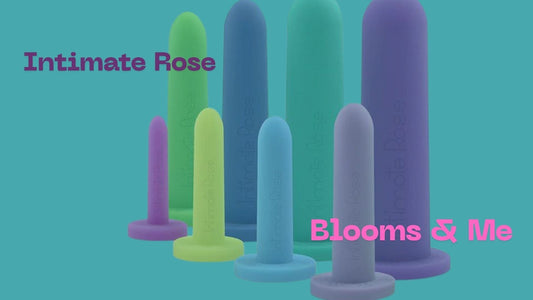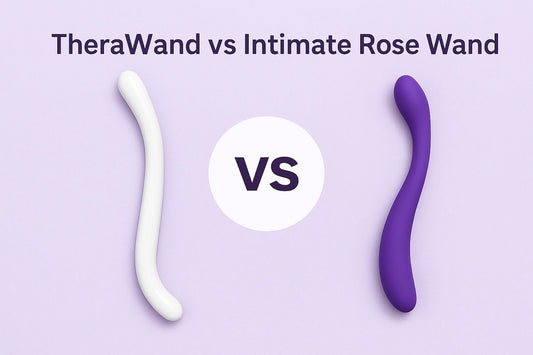Feeling itchy, smelly, or sweaty down there and considering using a feminine wash to feel more hygienic and smell better? Feminine washes are sold as cleaning products for the vulva and vaginal opening, promising to eliminate vaginal odors, improve genital hygiene, and prevent skin irritation. However, many feminine washes contain ingredients that upset vaginal health and cause infections.
The truth is, there is no need for women to use feminine washes. Mild vaginal odors are normal and the vagina is a self-cleaning part of the body with a naturally balanced microbiome and a mildly acidic pH level that keep it clean and healthy. And all that's really needed to maintain genital hygiene is warm water and a clean wash cloth.
That being said, women who suffer from sensitive genital skin, vaginitis, or recurring urinary tract infections (UTIs) often require a solution in between showers. For these reasons, we've compiled a list of the 7 best feminine washes that actually work and won't upset your vaginal pH or cause an infection.
We've also included some incredibly helpful remedies for preventing recurring vaginal infections and UTIs.
How to Choose a Safe Feminine Wash That Won't Upset Your Vaginal pH?
Although feminine washes are not necessary, women who prefer to use them should be aware of some vital criteria beforehand.
First and foremost, make sure the chosen feminine wash has a pH that is compatible with the vaginal pH (3.8 - 4.5) to prevent the onset of vaginitis, UTIs, or STIs.
Avoid feminine washes that contain parabens, sulfates, or phthalates, which are known to irritate delicate or sensitive skin and upset the vaginal pH.
Only buy fragrance-free feminine washes to prevent synthetic scents from disrupting the vaginal pH levels. Feminine washes with essential oils, each of which has various pH levels, should also be avoided.
7 Best Feminine Washes That Actually Work
While we reiterate that feminine washes are not necessary, and only warm water with a clean wash cloth is required for daily genital hygiene, the following feminine washes are hypoallergenic, free of harmful ingredients, fragrance-free, and dermatologically tested for sensitive skin.
1. Dove Sensitive Skin Beauty Bar
This unscented, hypoallergenic bar of soap is the best feminine wash for the outer genitals, according to worldwide gynecologists, even on the most sensitive skin. It contains no harmful ingredients that upset the vaginal pH and at $12 for a pack of eight bars of soap, it's also incredibly cost-effective.
2. Maude Wash No. 0
Women who are prone to UTIs and vaginal infections often avoid baths due to the harmful and scented ingredients included in many bubble bath products. Maude Wash No. 0 is a fragrance-free, non-irritating feminine wash designed to protect the vaginal pH that can also be used for bubble baths. Although a little pricey at $22 for a 12 oz bottle, bubble-bath-loving women who are susceptible to recurring vaginal infections appreciate it.
3. The Honey Pot Company Sensitive Foaming Wash
This well-known brand is designed to maintain an ideal vaginal pH through its natural plant-derived ingredients - lavender, calendula, and apple cider vinegar. Free of harmful sulphates and parabens, it promises to enhance skin moisture while gently washing the outer genitals. Costing $9.88 for a 5.5 oz bottle, it's also reasonably priced.
4. Summer's Eve Fragrance-Free Cleansing Cloths
Formulated with protecting the vaginal pH in mind, these unscented cleansing cloths are free of harmful ingredients and a handy on-the-go option for after the gym or cleaning leaks during menstruation. Priced at $3.70 for a pack of 32 wipes, they are cost-effective and easy to carry in a handbag.
5. Love Wellness pH Balancing Cleanser
This fragrance-free vulvar cleanser is formulated as vaginal-pH-friendly and contains aloe vera and calendula to protect dry genital skin and relieve irritation. Advertised to combat vulvar itching and discomfort, it's also priced well at $14 for a 5 oz bottle. However, if using to relieve vulvar discomfort, it's wise to check that symptoms are not linked to an underlying vaginal infection.
6. Dr. Barbara Sturm V Wash
This unscented vulvar wash includes probiotics, prebiotics, lactic acid, and hyaluronic acid to hydrate dry or irritated genital skin. Although some women experiencing recurring UTIs appear to enjoy the lathering wash it provides, it contains glycerin, which can have a drying effect on sensitive skin. Priced at $75 for 6.6 oz, it's not the cheapest either.
7. Enchanted Rose Vaginal and Vulva Moisturizer
While it's not a feminine wash, the Enchanted Rose and Vulva Moisturizer is the perfect soothing balm to apply on dry or sensitive vulvar skin after a shower, bath, or feminine wash. Made with natural, non-harmful ingredients and formulated to protect the vaginal pH, it's incredibly soothing after sex, clothing irritation, pubic hair grooming, or a workout. And priced at just $24.99 for a 2 oz jar, it's a low-cost investment in your vulvar health and won't upset your vaginal pH.
Other Ways to Stay Clean and Fresh Down There
-
Drink at least 1.5 liters of water per day to stay hydrated
-
Wipe from front to back after using the toilet
-
Never hold an urge to urinate
-
Pee before and after sex
-
Wash the genitals after sex with warm water and a clean wash cloth
-
Change out of damp gym clothing or wet swimsuits as soon as possible
-
Consider wearing breathable cotton underwear instead of synthetic materials to prevent perspiration
-
Avoid tight-fitting pants or jeans that could cause vulvar discomfort
What Are Feminine Washes?
Feminine washes are hygiene products that commercial businesses create and advertise to make more money. Purported to clean the vulva and vaginal opening, ease genital odors, and wash away vaginal discharge or unwanted wetness, these products are superfluous to women's health and often do more harm than good.
Feminine washes are divided into two categories. Those that claim to wash the vagina are called (douches) and those that 'clean' the vulva (outer vagina), are known as feminine washes.
Douching, which involves squirting a mixture of water and other fluids into the vaginal canal to 'clean' it, is never recommended. The vagina is a self-cleaning organ that knows instinctively how to clean itself and washing it from the inside can harm its pH and microbiome (a delicately balanced mix of friendly and harmful bacteria). When the vaginal pH is altered there is an increased risk of vaginal infections and sexually transmitted infections (STIs).
While there are fewer risks linked to feminine washes, they are not risk-free. Not all brands contain ingredients that are healthy or safe for the vagina and using the wrong type can increase the risk of vaginitis, UTIs, and STIs.
What is Vaginitis?
Vaginitis is an umbrella term to describe vaginal inflammation accompanied by irritation, itching, changes in vaginal discharge and odor. It is typically caused by disruptions in the vaginal pH, which in turn allows harmful bacteria, fungi, or parasites to overgrow and results in an infection.
The most common types of vaginitis are bacterial vaginosis (BV), STIs called trichomoniasis, and yeast infections.
What is the Vaginal pH?
The vaginal pH and vaginal microbiome maintain a symbiotic relationship to keep the female genitals clean and healthy. For example, a healthy vaginal pH is mildly acidic (3.8 - 4.5) and stabilized by the delicate balance of good and harmful bacteria in the vaginal microbiome. At the same time, healthy vaginal pH levels also prevent harmful microbes in the microbiome from overgrowing and causing an infection.
For these reasons, women are encouraged to protect the vaginal pH by avoiding products that contain harmful ingredients like parabens, sulphates, phthalates, or synthetic flavors, and fragrances.
Will Feminine Washes Make Your Vagina Smell Better?
Many women believe that using a feminine wash, particularly fragranced feminine washes, will make their genitals smell better, however, this could not be further from the truth. In fact, using a fragranced feminine wash could inevitably cause your vagina to smell worse.
Each woman's vaginal odor is unique and dependent on their genital hygiene, vaginal pH level, daily activities, food choices, hydration, and menstrual cycle. However, washing the genitals with warm water and a clean washcloth is typically enough to keep the vagina smelling fresh. Perspiration, post coital or food odors, and a metallic smell from menstrual blood can also be easily eliminated by washing the genitals with warm water and a clean wash cloth.
Using a scented feminine wash, on the other hand, can adversely alter the vaginal pH, and increase the risk of vaginitis by allowing harmful bacteria to overgrow.
What If an Unpleasant Vaginal Odor Doesn't Go Away After Washing
An unpleasant vaginal odor that lingers for a few days, despite regular washing, could be a sign of an underlying infection like BV, trichomoniasis, yeast infection, or UTI. Particularly if the unusual vaginal smell is accompanied by vulvar itching or inflammation, a burning sensation when urinating, or an unfamiliar vaginal discharge.
To rule out infection or prescribe the necessary treatment, these symptoms should always be checked by a healthcare provider. Treating BV, trichomoniasis, and UTIs requires antibiotics, and antifungal medication is prescribed to treat yeast infections.
Unfortunately, BV is known to reoccur in 50% of women and yeast infections in 8%. For this reason, gynecologists recommend using Boric Acid Suppositories in conjunction with antibiotic treatment to prevent both from recurring. These effective suppositories can restore healthy vaginal pH levels, relieve vaginal odors, and alleviate symptoms like itching and inflammation within 24 hours.
Women who are prone to recurring BV and yeast infections can use Boric Acid Suppositories long-term to prevent future infections. And a daily Flora Bloom Probiotic with added cranberry and D mannose also helps restore a healthy vaginal pH balance and provide further protection from recurring infections. Those experiencing recurring UTIs can also benefit from a daily Flora Bloom Probiotic with added cranberry and D mannose to rebalance the vaginal pH levels. To quickly soothe UTI symptoms and prevent them from recurring, Dried Aloe Vera Supplements with D-Mannose & Calcium can control the offending bacteria while easing inflammation and pain.
Conclusion
It's important, so we'll say it one more time. Feminine washes are not necessary to keep the genitals clean, treat vaginal odors, or prevent skin irritation. Douching, or washing out the vaginal canal is never recommended and, in most cases, a daily wash of the vulva with warm water and a clean wash cloth is all the female genitalia need to stay clean.
That said, if an unpleasant vaginal odor persists and is accompanied by genital itching, burning, or irritation, consulting a healthcare provider is advised to rule out vaginal infections like BV, yeast infections, STIs or UTIs.
Women susceptible to recurring vaginal infections can benefit from Boric Acid Suppositories to ease symptoms within 24 hours and daily probiotics to maintain a healthy vaginal pH into the future. Those who use feminine washes to prevent UTIs can find relief in Dried Aloe Vera Supplements with D-Mannose & Calcium.
References
National Library of Medicine - Role of female intimate hygiene in vulvovaginal health: Global hygiene practices and product usage - https://pmc.ncbi.nlm.nih.gov/articles/PMC7789027/
Office on Women's Health - Douching - https://womenshealth.gov/a-z-topics/douching
Johns Hopkins Medicine - Vaginitis - https://www.hopkinsmedicine.org/health/conditions-and-diseases/vaginitis
National Library of Medicine - Vaginal pH Value for Clinical Diagnosis and Treatment of Common Vaginitis - https://www.ncbi.nlm.nih.gov/pmc/articles/PMC8618584/
National Center for Biotechnology Information - Clinician's use of Intravaginal Boric Acid Maintenance Therapy for Recurrent Vulvovaginal Candidiasis and Bacterial Vaginosis - https://www.ncbi.nlm.nih.gov/pmc/articles/PMC6878170/
National Center for Biotechnology Information - Anti-inflammatory effects of aloe vera gel in human colorectal mucosa in vitro - https://pubmed.ncbi.nlm.nih.gov/14987320/
Cleveland Clinic - Are Probiotics Good For Vaginal Health - https://health.clevelandclinic.org/probiotics-for-vaginal-health/



